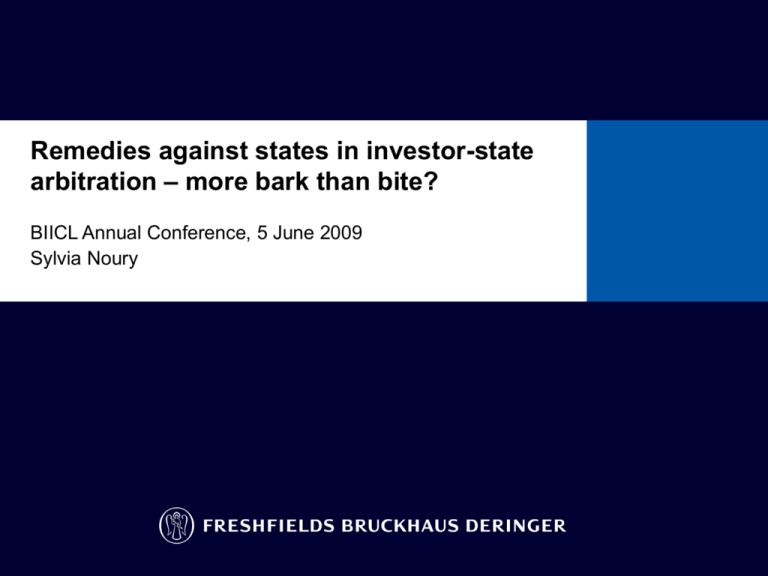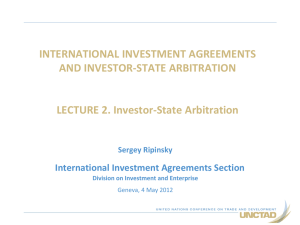bark than bite? - British Institute of International and Comparative Law
advertisement

Remedies against states in investor-state arbitration – more bark than bite? BIICL Annual Conference, 5 June 2009 Sylvia Noury Introduction Today, some 3,000 BITs / MITs signed providing investor-state protection and, in most cases, access to arbitration. Explosion of investment treaties has resulted in more claims against states and broader application of state responsibility. Large body of investor-state jurisprudence (100 decided ICSID cases alone), enables a review of remedies awarded against states. Three key questions: What remedies are available against states under international law beyond monetary compensation? How likely is an international tribunal to order those remedies? How enforceable are those remedies, ultimately? Introduction Dr Christine Gray, Judicial Remedies in International Law, 1990: Availability of non-pecuniary remedies against states described as “a chaos of conflicting decisions.” Since then: adoption of ILC’s Draft Articles on the Responsibility of States for Internationally Wrongful Acts 2001 (Draft Articles). Article 34 : Forms of Reparation “Full reparation for the injury caused by the internationally wrongful act shall take the form of, in restitution, compensation and satisfaction, either singly or in combination accordance with the provisions of this chapter.“ Do these remedies have more “bark than bite” in investment treaty arbitrations? I. Pecuniary Remedies – Compensation Standard of compensation in international law Factory at Chorzow, PCIJ, 1928 “Reparation must as far as possible wipe out all the consequences of the illegal act and re-establish the situation which would in all probability have existed if that act had not been committed. Restitution in kind or, if this is not possible, payment of a sum corresponding to the value which restitution in kind would bear.” Codified in ILC Draft Articles: Article 31: Reparation “1. The responsible State is under an obligation to make full reparation for the injury caused by the internationally wrongful act. 2. Injury includes any damage, whether material or moral, caused by the internationally wrongful act of a State.” Standard of compensation in international law Article 36: Compensation “1. The State responsible for an internationally wrongful act is under an obligation to compensate for the damage caused thereby, insofar as such damage is not made good by restitution. 2. The compensation shall cover any financially assessable damage including loss of profits insofar as it is established.” Application in investor-state disputes: compensation is norm, e.g. CMS v Argentina (ICSID Award 25 May 2005) ADC v Hungary (ICSID Award 2 October 2006) Punitive or moral damages Punitive damages are not available under international law, but moral damages are: Article 31(2) ILC Draft Articles. ICSID tribunals have only awarded moral damages on two occasions Desert Line v Yemen (ICSID Award 6 February 2008): Tribunal awarded US$1 million of moral damages. Benvenuti v. Congo (ICSID Award 8 August 1980): Tribunal awarded CFA5 million of moral damages. Interest part of “full reparation”: Article 38 ILC Draft Articles. High rate of interest, compounded, can serve to ‘penalise’ states: Henricus Funnekotter v Zimbabwe (ICSID Award 22 April 2009). Tribunal awarded 10% interest compounded every six months. Enforcement of pecuniary awards States are obliged by BIT/MIT to comply voluntarily with award. Article 53 ICSID Convention: (1) The award shall be binding on the parties and shall not be subject to any appeal or to any other remedy except those provided for in this Convention. Each party shall abide by and comply with the terms of the award except to the extent that enforcement shall have been stayed pursuant to the relevant provisions of this Convention. [….] Vast majority of awards against states are performed without need for enforcement (legal and political consequences if not). Until recently, only four ICSID awards (against Congo, Senegal, Liberia and Kazakhstan) were not complied with voluntarily. Enforcement of pecuniary awards ICSID Convention contains favourable enforcement mechanism if state does not comply voluntarily - Article 54: (1) Each Contracting State shall recognize an award rendered pursuant to this Convention as binding and enforce the pecuniary obligations imposed by that award within its territories as if it were a final judgment of a court in that State. A Contracting State with a federal constitution may enforce such an award in or through its federal courts and may provide that such courts shall treat the award as if it were a final judgment of the courts of a constituent state. [….] Infamous fifth instance of an unsatisfied ICSID award : CMS v Argentina (ICSID Award 25 May 2005, Decision on Annulment 25 September 2007). Enforcement of pecuniary awards Key to enforcement of ICSID awards is to find attachable assets in one of 143 ICSID Contracting States. NB Article 55: “Nothing in Article 54 shall be construed as derogating from the law in force in any Contracting State relating to immunity of that State or of any foreign State from execution.” Article 54 ICSID Convention: covers only enforceability of pecuniary obligations imposed by ICSID award. Limitation was agreed due to concerns in feasibility re: enforcement of non-pecuniary obligations ICSID Convention Drafting History clarifies that an ICSID tribunal has the power not only to award monetary damages, but also to order a party to perform a specific act or desist from a particular course of action. Non-Pecuniary Remedies – Provisional Measures Availability of Provisional Measures Investors may require urgent action to be taken to block adverse measures of state pending ultimate resolution of the dispute. Provisional measures not listed in ILC Draft Articles, although are provided for in Article 41 of ICJ Statute. Article 47 of ICSID Convention: “Except as the parties otherwise agree, the Tribunal may, if it considers that the circumstances so require, recommend any provisional measures which should be taken to preserve the respective rights of either party.” Power to “recommend” is the equivalent of a binding order Maffezini v Spain, ICSID Decision 28 October 1999. Provisional measures can be ordered only when they are necessary and urgent, in order to preserve effectiveness of proceedings and avoid aggravation of dispute; “irreparable harm” not required. ICSID Provisional Measures Of 32 publicly available ICSID decisions on provisional measures: 11 tribunals granted measures requested against states. 11 tribunals refused to grant measures requested against states. Of the 11 orders for provisional measures granted against states Six ordered the state to refrain from taking specific steps (e.g. seizing the investor’s assets or commencing proceedings against it). Three ordered the state to take specific steps (e.g. suspending bankruptcy proceedings against the investor). Two ordered the state to provide certain documents or otherwise obtain or preserve evidence. Four also ordered the state refrain from “aggravating the dispute”. Recent example: Perenco v Ecuador Perenco v Republic of Ecuador, ICSID Decision on Provisional Measures of 8 May 2009 Tribunal ordered Ecuador to refrain from: demanding that Perenco pay amounts due pursuant to Law 42; instituting or pursuing any action to collect payments due from Perenco pursuant to Law 42; instituting or pursuing any action against Perenco or any of its officers or employees, arising from or in connection with the Participation Contracts; and unilaterally amending or terminating the Participation Contracts or engaging in any other conduct which may alter the legal situation the parties. Recent example: Perenco v Ecuador “It is pertinent to recall that in any ICSID arbitration one of the parties will be a sovereign State, and where provisional measures are granted against it the effect is necessarily to restrict the freedom of the State to act as it would wish. Interim measures may thus restrain a State from enforcing a law pending final resolution of the dispute on the merits” “While the enactment of a law by a sovereign State, upheld as constitutional in that State, is a matter of importance, it cannot be conclusive or preclude the Tribunal from exercise of its power to grant provisional measures.” Plenty of bark – what about the bite? Ecuador has not complied. Non-Pecuniary Remedies – Restitution and Specific Performance Non-Pecuniary Remedies What if compensation is not an adequate remedy? Pre ILC Draft Articles, confusion over whether restitution or specific performance available remedies against states: Texaco v Libya (Award, 19 January 1977): arbitrator issued a declaration that the concession agreements were binding and gave the Libyan Government 90 days to comply, after which alternative remedies would be considered. Cf: BP v Libya “there is no explicit support for the proposition that specific performance…[is] a remedy of public international law available” LIAMCO v Libya: “restitution presupposes the cancellation of the nationalisation measure at issue, and such cancellation violates the sovereignty of the nationalizing state. Non-Pecuniary Remedies ILC Draft Articles Article 29: Continued duty of performance “The legal consequences of an internationally wrongful act under this part do not affect the continued duty of the responsible State to perform the obligation breached.“ Article 30: Cessation and non-repetition “The State responsible for the internationally wrongful act is under an obligation: (a) To cease that act, if it is continuing; (b) To offer appropriate assurances and guarantees of non-repetition, if circumstances so require.” Non-Pecuniary Remedies (continued) Article 35: Restitution “A State responsible for an internationally wrongful act is under an obligation to make restitution, that is, to re-establish the situation which existed before the wrongful act was committed, provided and to the extent that restitution: (a) Is not materially impossible; (b) Does not involve a burden out of all proportion to the benefit deriving from restitution instead of compensation.” Non-Pecuniary Remedies (continued) Article 37: Satisfaction “1. The State responsible for an internationally wrongful act is under an obligation to give satisfaction for the injury caused by that act insofar as it cannot be made good by restitution or compensation. 2. Satisfaction may consist in an acknowledgement of the breach, an expression of regret, a formal apology or another appropriate modality. 3. Satisfaction shall not be out of proportion to the injury and may not take a form humiliating to the responsible State.” A realistic remedy in investor-state arbitration? Relevance of ILC Draft Articles in investor-state disputes (e.g. “satisfaction”, such as an apology, unlikely to suffice). Non-pecuniary remedies are available in investor-state disputes unless limited by the relevant contract, treaty or applicable law (see e.g. US and Canadian Model BITs). Enron v Argentina (Decision on Jurisdiction of 14 January 2004) “An examination of the powers of international courts and tribunals to order measures concerning performance or injunction and of the ample practice that is available in this respect, leaves this Tribunal in no doubt about the fact that these powers are indeed available. […] The Tribunal accordingly concludes that, in addition to declaratory powers, it has the power to order measures involving performance or injunction of certain acts.” A realistic remedy in investor-state arbitration? Few examples of international tribunals ordering specific performance or restitution. This is because of enforcement issues: Arbitrators lack the military powers required to enforce anything but a pecuniary award. Enforcement provisions of the ICSID Convention (Article 54) confined to pecuniary remedies. Several investors have requested specific performance in their requests for arbitration against states: E.g. Perenco v Ecuador Specific performance may be combined with damages in an award: Goetz v Republic of Burundi (ICSID Award February 1999): Tribunal offered Burundi two options: (1) pay fair and adequate compensation for termination of licence or (2) reinstate licence: matter left to “sovereign discretion” of Burundi. Eventually did both. Conclusion Conclusion In vast majority of cases, damages are the only remedy sought and awarded in investor-state cases for reasons of enforceability. Specific performance is rarely awarded. Increasing trend to order provisional measures pending resolution of dispute. Voluntary compliance with awards against states: Damages awards usually voluntarily complied with (e.g. Yemen immediately paid Desert Line award, including moral damages); Provisional measures and specific performance more difficult, as impinge on state sovereignty (Ecuador has not complied with Perenco order, cf Burundi settled Goetz matter by reinstating licence). What is the ultimate bite of these remedies? Enforcement of pecuniary award by attaching assets through courts. As for non-pecuniary remedies: they are ulitmately more bark than bite. © Freshfields Bruckhaus Deringer LLP 2009 This material is for general information only and is not intended to provide legal advice.



